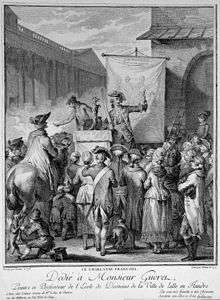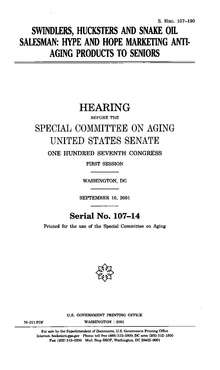Huckster
A huckster is anyone who sells something or serves biased interests, using pushy or showy tactics. Historically, the term meant any type of vendor, but over time it has assumed pejorative connotations.
_(14594583307).jpg)
Etymology
The original meaning of huckster is a person who sells small articles, either door-to-door or from a stall or small store, like a peddler or hawker. The term probably derives from the Middle English hucc meaning to haggle.[1] The word was in use circa 1200 (as "huccsteress"). During the medieval period, the word assumed the feminine word ending "ster" as in huckster reflecting the fact that most hucksters were women.[2] The word assumed various spellings at different times: hukkerye, hukrie, hockerye, huckerstrye or hoxterye. The word was still in use in England in the 1840s, when it appeared as a black market occupation. It is related to the Middle Dutch hokester, hoekster and the Middle Low German höker, but appears earlier than any of these.[3] In the United States, there developed a connotation of trickery – the huckster might trick others into buying cheap imitation products as if they were the real thing.
Other meanings

The term, 'huckster', was used in different ways across Europe and also took on different meanings at different times.
In Scotland
In Scotland, the term huckster referred to a person, usually a woman, who bought goods, watered them down, and resold them in tiny quantity to others who were too poor to buy quality products available at market value. These items tended to be in the poorer quality range since economy was paramount. Scots burghs often felt the need to control hucksters because they operated without a stall, on the economic fringes. In particular, they were subject of accusations of forestalling, in this case the practice of buying goods wholesale, "before the stall" and therefore before tax was paid.
In England and Europe
In England and Europe during the medieval period, the term 'huckster' was synonymous with peddler. Hucksters and peddlers belonged to a broad group of resellers who purchased surplus stocks from weekly provincial markets and fairs and then resold them at larger daily markets or engaged in door-to-door selling.
Over time, the distinction between hucksters and peddlers became more pronounced. During the medieval period, the term, huckster, came to refer to market-based food vendors while peddlers referred to itinerant vendors of a wide range of merchandise. Hucksters were often women, who dealt in low-priced goods such as meat, poultry, dairy, bread and baked goods including pies and pastries. They sourced raw materials from their own holdings or purchased goods from other sellers, and carried their products to the market place in baskets or on their heads. These women either lived in the market town, or travelled into the market place from the surrounding area. Hucksters were at the bottom of the market hierarchy, both in terms of wealth and status since they made only small returns. [4]
Luca Clerici has made a detailed study of Vicenza’s food market during the sixteenth century. He found that there were many different types of reseller operating out of the markets. For example, in the dairy trade, cheese and butter was sold by the members of two craft guilds (i.e., cheesemongers who were shopkeepers) and that of the so-called ‘resellers’ (hucksters selling a wide range of foodstuffs), and by other sellers who were not enrolled in any guild. Cheesemongers’ shops were situated at the town hall and were very lucrative. Resellers and peddlers increased the number of sellers, thus increasing competition, to the benefit of consumers. Direct sellers, who brought produce from the surrounding countryside, sold their wares through the central market place and priced their goods at considerably lower rates than cheesemongers.[5]
In 20th-century Philadelphia

In the Philadelphia of the past century the huckster was the man who came around with his cart of vegetables. The cart may have been mechanical or even horse drawn. He was the man from whom you bought all your products. The huckster made his presence known by crying out loud what he had to offer. In old time Philadelphia dialect, to say "like a huckster" meant to be too loud in one's speech.
In literature and popular culture
In "The Goblin and the Grocer"
The story "The Goblin and the Grocer" by Hans Christian Andersen relates that human nature is attracted to a state of happiness as represented by poetry and to sensual pleasure as represented by jam and butter at Christmas. Although the story has been mistakenly called "The Goblin and the Huckster," it has nothing to do with that term (pejoratively). The Grocer, through his haggling and bargaining, is seen as industrious because he possesses the jam and butter (sensual pleasure) and the student is seen as poor but happy because he appreciates the beauty of poetry above all else. Meanwhile, the Grocer's talkative wife and the cask in which are stored old newspapers both have plenty of authoritative knowledge to share but are paid little attention compared to the primal desires of humankind, which constantly compete for (the goblin's) attention.[6]
Huckster used in citation
Hucksters want their claims to look like science for a reason. Science works hard to ascertain facts. But just looking like science is not the same as having all the evidence. Pseudoscience is like a magician's trick. It seems believable, but it is all crafty illusion. Douglas Allchin[7]
In science fiction fandom
In science fiction fandom, the term "huckster" is used non-pejoratively to designate dealers in science fiction–related books, magazines and paraphernalia,[8] particularly those who deal at science fiction conventions.
Popular references
| Look up huckster in Wiktionary, the free dictionary. |
- The Hucksters (1947), an American film starring Clark Gable as a slick Madison Avenue advertiser.
- #Hucksters4Life Popular hashtag within the Twitter #WritingCommunity. Some of the first #Hucksters in the #Hucksters4Life group as determined by a third party Twitter user include Darryl Ballegeer, Patrick F. Johnson, Torsten Krol, Rebecca Velland, Mike Wells, David Gane, Dzintra Sulliven and Mandy Lawson.
See also
- Arabber
- Costermonger
- Direct sales
- Hawker (trade)
- History of marketing
- Market (place)
- Market town
- Merchant
- Peddler
- Personal selling
- Quackery
- Retail
- Street vendor
References
- "huckster" – via The Free Dictionary.
- Davis, J., Medieval Market Morality: Life, Law and Ethics in the English Marketplace, 1200-1500, Cambridge University Press, 2012, p. 7
- Oxford English Dictionary, 2nd ed. (1989), "Huckster, n."
- Davis, J., Medieval Market Morality: Life, Law and Ethics in the English Marketplace, 1200-1500, Cambridge University Press, 2012, pp 7-8
- Clerici, L., "Le prix du bien commun. Taxation des prix et approvisionnement urbain (Vicence, XVIe-XVIIe siècle)" [The price of the common good. Official prices and urban provisioning in sixteenth and seventeenth century Vicenza] in I prezzi delle cose nell’età preindustriale /The Prices of Things in Pre-Industrial Times, [forthcoming], Firenze University Press, 2017.
- Lang, Andrew (1889). The Pink Fairy Book. www.sacred-texts.com.
- Allchin, Douglas. "Podcast #704 - January 5th, 2019". The Skeptics Guide to the Universe. Retrieved 8 February 2019.
- Franson, Donald (1962). "A Key to the Terminology of Science Fiction Fandom". National Fantasy Fan Federation.